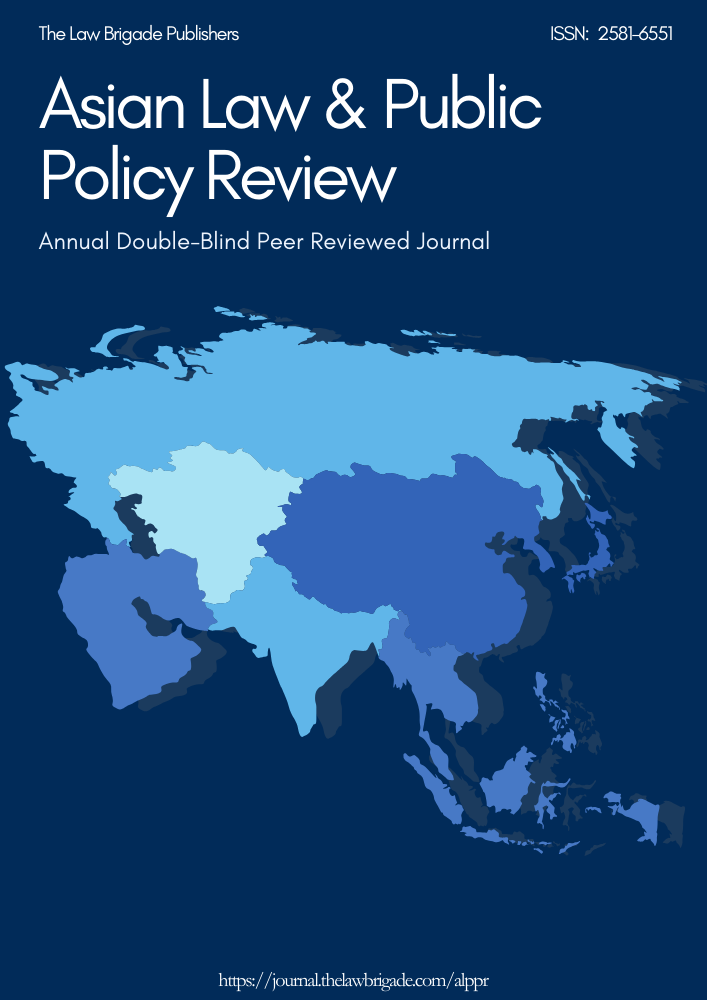A Comparison of Corporate Social Responsibility (CSR) Norms In India And The United Kingdom
Keywords:
CSR Norms in India and the UK, Comparing the CSR Norms between India and the UK, CSR and its Future in India and the UKAbstract
Corporate Social Responsibility (CSR) is the approach or policy adopted by organisations in order to achieve sustainable development by providing social, environmental, and technical support to members of society. The ‘United Nations Industrial Development Organization’ has defined CSR as a concept of management where the companies combine their social and environmental concerns in their business dealings. CSR is known as the ‘Triple-Bottom-Line Approach’, as it promotes the commercial interests of an organisation and fulfils its social obligations and duties. CSR is different from charity and other philanthropic activities. India is the first nation in the world to mandate CSR spending. The UK, on the other hand, is one of the first countries to introduce a ‘Triple Bottom Line Approach’ into the structure of corporations. CSR Regulations have become extremely significant for the purpose of promoting the sustainability of the business as well as the environment. Although India and the UK are pioneers in this concept, they have adopted a different approaches towards the same. India is the first country to mandate CSR spending in the field of corporate law. The UK, on the contrary, does not mandate any CSR spending. However, it is one of the first countries to integrate the ‘Triple Bottom Line Approach’ of people, profit, and the planet, among its firms through different regulations. This shows that India follows a ‘Mandatory’ approach to CSR spending as compared to the UK, which abides by the ‘Voluntary’ approach to CSR spending.[i] This article begins with a brief introduction to the concept of Corporate Social Responsibility (CSR). It talks about the evolution and the history of CSR in India and the United Kingdom (UK). It goes on to deal with the CSR Regulations in India as well as in the UK that are in place at the present. The strategies and practices adopted by some of the major and well-reputed organisations in India and the UK are also discussed. Finally, the article attempts to analyse the future of CSR strategies and practices in India and the UK.
Downloads
References
i Sirgapoor Sahil Reddy, Comparing the CSR Regulations in India and the UK, LEGAL MAXIM (Aug. 20, 2020),
https://www.legalmaxim.in/comparing-the-csr-regulations-in-india-and-the-uk/.
ii CA. Neha Verma, Corporate Social Responsibility: Global Evolution and Challenges in India, 4 IJRSI 79, 81-
82 (2017).
iii Sawati Nagwan, Evolution of Corporate Social Responsibility in India, 3 IJLTEMAS 164, 164-165 (2014).
iv Verma, supra note 2, at 79-80.
v Reddy, supra note 1.
vi CSR Amendment Rules 2021, CLEARTAX (Apr. 14, 2022, 03:10 PM), https://cleartax.in/s/csr-amendmentrules-2021.
vii CLAYTON FONCECA „&‟ A. UMESH SAMUEL JEBASEELAN, CSR IN UK AND IN INDIA – AN
OVERVIEW, 1 AARJSH 336, 339 (2013).
viii Mayank Barman, To Impose or Not? Comparing CSR Framework in India & UK, THE COMPETITION &
COMMERCIAL LAW REVIEW (May 4, 2021), https://www.tcclr.com/post/to-impose-or-not-comparing-csrframework-in-india-uk.
ix Sakshi Shairwal, Corporate Social Responsibility Funding in India, LEXOLOGY (Apr. 16, 2021),
https://www.lexology.com/library/detail.aspx?g=bcc0b4fe-327c-4bea-8021-0bbb67780c56.
x Reddy, supra note 1.
xi FONCECA „&‟ JEBASEELAN, supra note 7, at 337-339.
xii Helen Hopper, 5 CSR Strategies Successful Companies Are Using in the UK, DILIGENT (May 7, 2021),
https://www.diligent.com/en-gb/blog/csr-strategies/.
xiii Mauricio Andrés Latapí Agudelo “et al”, A Literature Review of the History and Evolution of Corporate Social
Responsibility, JCSR Jan. 22, 2019, at 1, 20.
xiv Corporate Social Responsibility in United Kingdom, TRANSPARENT HANDS (Sept. 22, 2017),
https://www.transparenthands.org/corporate-social-responsibility-in-united-kingdom/
xv Barman, supra note 8.
Downloads
Published
Issue
Section
License

This work is licensed under a Creative Commons Attribution-NonCommercial-ShareAlike 4.0 International License.
License Terms
Ownership and Licensing:
Authors of research papers submitted to any journal published by The Law Brigade Publishers retain the copyright of their work while granting the journal specific rights. Authors maintain ownership of the copyright and grant the journal the right of first publication. Simultaneously, authors agree to license their research papers under the Creative Commons Attribution-ShareAlike 4.0 International (CC BY-SA 4.0) License.
License Permissions:
Under the CC BY-SA 4.0 License, others are permitted to share and adapt the work, even for commercial purposes, provided that appropriate attribution is given to the authors, and acknowledgment is made of the initial publication by The Law Brigade Publishers. This license encourages the broad dissemination and reuse of research papers while ensuring that the original work is properly credited.
Additional Distribution Arrangements:
Authors are free to enter into separate, non-exclusive contractual arrangements for distributing the published version of the work (e.g., posting it to institutional repositories or publishing it in books), provided that the original publication by The Law Brigade Publishers is acknowledged.
Online Posting:
Authors are encouraged to share their work online (e.g., in institutional repositories or on personal websites) both prior to submission and after publication. This practice can facilitate productive exchanges and increase the visibility and citation of the work.
Responsibility and Liability:
Authors are responsible for ensuring that their submitted research papers do not infringe on the copyright, privacy, or other rights of third parties. The Law Brigade Publishers disclaims any liability for any copyright infringement or violation of third-party rights within the submitted research papers.


